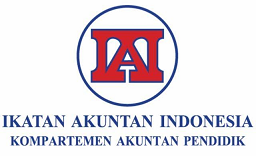ANALISIS FAKTOR DALAM DAN LUAR NEGERI TERHADAP JAKARTA ISLAMIC INDEX (JII) PERIODE 2010-2021
Abstract
This study aims to examine domestic and foreign factors on the Jakarta Islamic Index (JII) using the estimated Vector Error Correction Model. Monthly data used from January 2010 to December 2021 (144 months). This research generally gets two findings. First, in the long term domestic factors (exchange rates) and foreign factors (world oil prices, world gold prices and DJIMI) have a significant positive influence on JII. Second, in the long run domestic factors (inflation) and foreign factors (KLSE) have a significant negative influence on JII. This research is expected to provide benefits for academics and researchers who are interested in examining the factors that influence the Islamic capital market index in Indonesia.
Downloads
References
Arouri, M. E. (2016). Economic policy uncertainty and stock markets: long-run evidence from the US. Finance Research Letters, 18, 136–141.
Arouri, M. R. (2014). Economic policy uncertainty oil price shocks and GCC stock markets. Economics Bulletin, 38(3), 1822–1834.
Baker, S. R. (2016). Measuring economic policy uncertainty. The Quarterly Journal of Economics, 131(4), 1593–1636.
Basher, S. A. (2016). The impact of oil shocks on exchange rates: a Markov-switching approach. Energy Economics, 54, 11–23.
Bisnis.com. (2021). Komposisi Saham Kurang Ciamik, Indeks Syariah JII Tenggelam. Bisnis.Com. https://market.bisnis.com/read/20211210/189/1476023/komposisi-saham-kurang-ciamik-indeks-syariah-jii-tenggelam
Carri_ere-Swallow, Y. (2013). The Impact of uncertainty shocks in emerging economies. Journal of International Economics, 90(2), 316–325.
Chang, H.F., Huang, L.C. and Chin, M. C. (2013). Interactive relationships between crude oil prices, gold prices, and the NT–US dollar exchange rate—a Taiwan study. Energy Policy, 63, 441–448.
Fisher, R. A. (1930). The general theory of natural selection. Oxford University Press.
Fitrianto. (2020). PENGARUH DOW JONES ISLAMIC MARKET INDEX (DJIMI), KUALA LUMPUR STOCK EXCHANGE (KLSE), INFLASI, NILAI TUKAR/KURS, HARGA EMAS DUNIA, DAN HARGA MINYAK DUNIA TERHADAP PERGERAKAN JAKARTA ISLAMIC INDEX (JII) PERIODE 2010 – 2019. UIN Sunan Kalijaga Yogyakarta.
Ghumro, N. H., Soomro, I. A., & Abbas, G. (2022). Asymmetric effect of exchange rate and investors’ sentiments on stock market performance. Journal of Economic and Administrative Sciences. https://doi.org/10.1108/jeas-12-2020-0205
Harjito, D. (n.d.). Perubahan Musiman ( Seasonality ) Pasar Modal. 1–18.
Ho, Liang-C. & Huang, C. (2014). Did the contagion effect exist? Evidence from Abu Dhabi, Jordan and America. Economic Research, 27(1), 740–754.
Huybens, E. and Smith, B. (1999). Inflation, financial markets, and long-run real activity. Journal of Monetary Economics, 43, 283–315.
IDX Islamic. (2023). Saham Syariah. IDX Islamic. https://idxislamic.idx.co.id/edukasi-pasar-modal-syariah/saham-syariah/
Jamal, A., Salim, J., Seftarita, C., Mahmud, M. S., Mohd, W., Wan, N., Ghazali, P. L., & Rashid, N. (2018). Does Monetary Policy and Asean Stock Market Affect Jakarta Composite Index ( IHSG )? Does Monetary Policy and Asean Stock Market Affect Jakarta Composite Index ( IHSG )? 8(12), 1236–1248. https://doi.org/10.6007/IJARBSS/v8-i12/5120
Jufri, A., Adhillah, M., & Qoyum, A. (2022). Efek Asimetris Spillover Indeks Syariah Amerika Serikat dan Cina terhadap Indeks Syariah ASEAN selama Pandemi Covid-19. Jurnal Ekonomi Syariah Teori Dan Terapan, 9(3), 286–298. https://doi.org/10.20473/vol9iss20223pp286-298
Kang, W. R. (2017). Oil price shocks and policy uncertainty: new evidence on the effects of US and non-US oil production. Energy Economics, 66, 536–546.
Oktaviani, R. F. (2017). Index harga saham internasional terhadap Jakarta Islamic Index. Jurnal Ekonomika Dan Manajemen, 6(1), 1–15.
Qizam, I., Ardiansyah, M., & Qoyum, A. (2020). Integration of Islamic capital market in ASEAN-5 countries: Preliminary evidence for broader benefits from the post-global financial crisis. Journal of Islamic Accounting and Business Research, 11(3), 811–825. https://doi.org/10.1108/JIABR-08-2019-0149
Raza, N., Shahzad, S.J.H., Tiwari, A.K. and Shahbaz, M. (2016). Asymmetric impact of gold, oil prices and their volatilities on stock prices of emerging markets. Resources Policy, 49, 290–301.
Saeed Meo, M., Jameel, K., Chowdhury, M. A. F., & Ali, S. (2021). Islamic financial markets response to uncertainty: an application of quantile-on-quantile approach. Journal of Economic and Administrative Sciences. https://doi.org/10.1108/jeas-03-2021-0052
Santillán-salgado, R., Calderón-villarreal, C., & Venegas-martínez, F. (2017). Impact of Oil Prices on Stock Markets in Major Latin American Countries ( 2000-2015 ). 7(4), 205–215.
Suriani, S., Kumar, M. D., Jamil, F., & Muneer, S. (2015). Impact of Exchange Rate on Stock Market. 5(2004), 385–388.
Tursoy, T., & Faisal, F. (2017). The impact of gold and crude oil prices on stock market in Turkey : Empirical evidences from ARDL bounds test and combined cointegration. February.

This work is licensed under a Creative Commons Attribution-NonCommercial-ShareAlike 4.0 International License.
Jurnal Akutansi dan Keuangan allows readers to read, download, copy, distribute, print, search, or link to the full texts of its articles and allow readers to use them for any other lawful purpose. The journal allows the author(s) to hold the copyright without restrictions. Finally, the journal allows the author(s) to retain publishing rights without restrictions
Authors are allowed to archive their submitted article in an open access repository
Authors are allowed to archive the final published article in an open access repository with an acknowledgment of its initial publication in this journal







